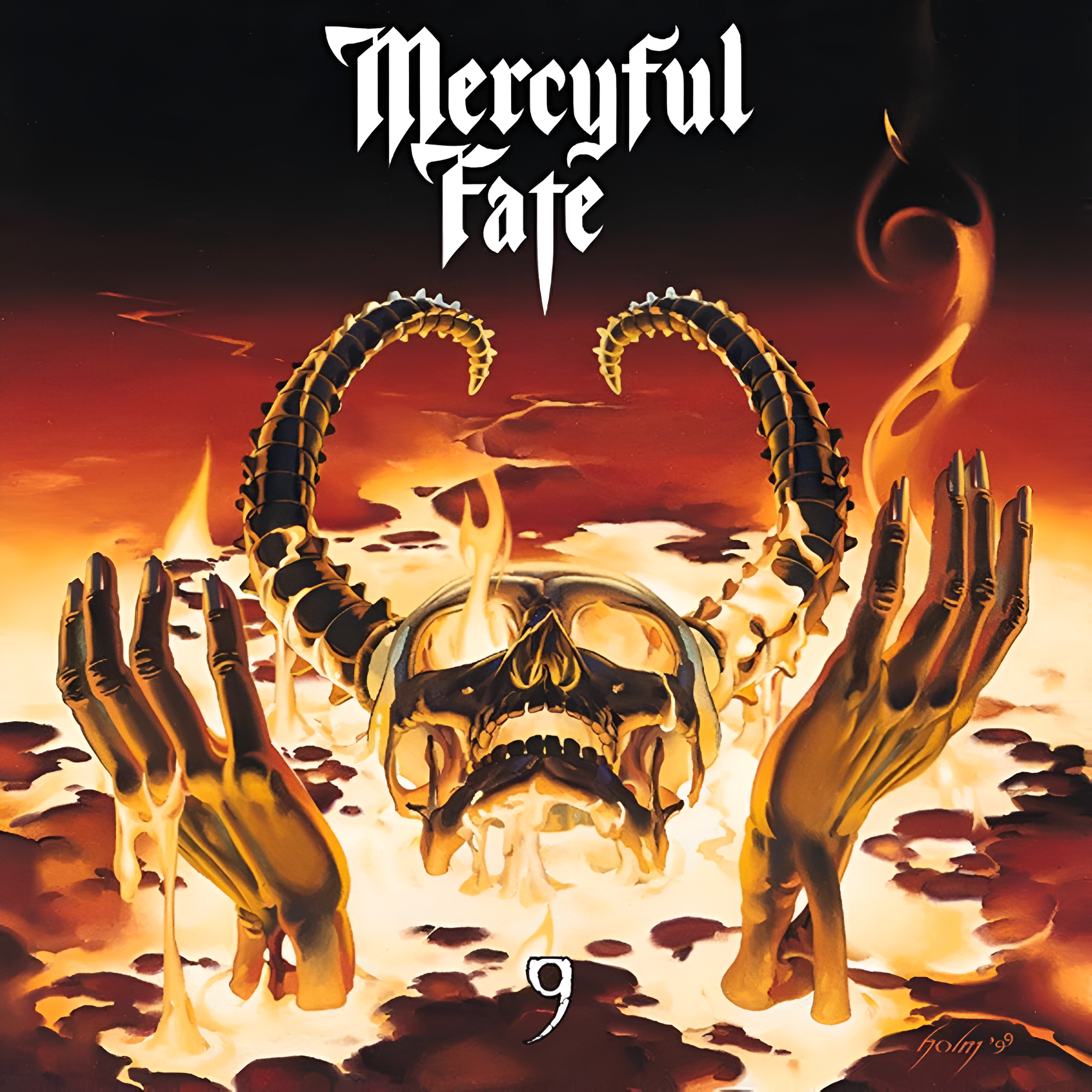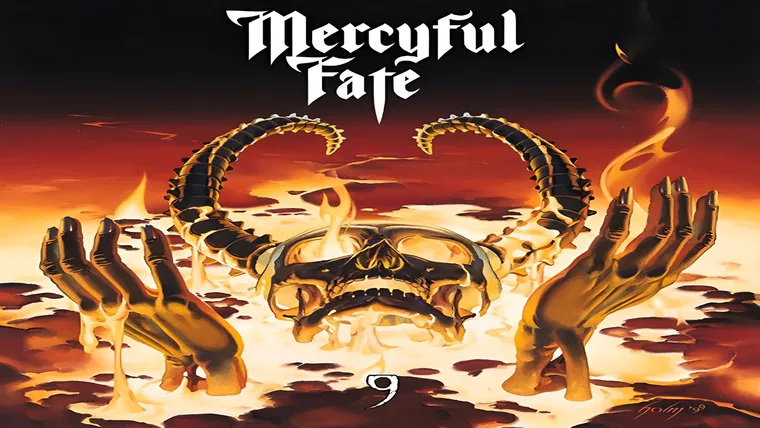
By the time 9 arrived in 1999, metal’s old gods were either fading into nostalgia circuits or struggling to define their relevance in a genre they had once helped create. The underground had splintered into blackened extremity and progressive experimentation, while the mainstream leaned hard into nu-metal’s angst-ridden stomp. Mercyful Fate, however, was never a band to bow to trends. Led by the ever-enigmatic King Diamond, they walked their own path—one lit by candlelight, cloaked in ritual, and soaked in blood.
9 was their last full-length album before a decades-long silence, and it sounds like a band aware of that inevitability. Rather than retreat into the grandiose or play it safe, Mercyful Fate crafted one of their leanest, most aggressive, and unrelenting records—a pure distillation of their core identity, stripped of any pretense. This wasn’t a curtain call. It was a final invocation, a spell cast in fire and steel.
The Riff is the Law: Precision, Speed, and Malevolence
The album wastes no time in setting the tone. Opener “Last Rites” charges out of the gate with razor-edged riffs and a pounding rhythm section that feels far more influenced by late-’80s thrash than the baroque occult metal of Don’t Break the Oath. Hank Shermann and Mike Wead’s guitars slice like ritual daggers—fast, intricate, and sharp enough to draw blood. Every track pulses with urgency, as if the band knows this could be the last time these demons are summoned.
Where earlier albums embraced winding structures and theatrical interludes, 9 thrives on direct impact. “Church of Saint Anne” and “House on the Hill” are some of the most visceral songs the band has ever recorded—tight, riff-driven, and propelled by Bjarne T. Holm’s militaristic drumming. Sharlee D’Angelo’s bass work, often understated, gives the album a punchy low end that anchors the guitars without ever weighing them down. The solos, when they come, are not ornamental—they’re exorcisms in six-string form.
King Diamond, of course, remains the focal point. His vocals on 9 are among his fiercest—eschewing some of his trademark falsetto theatrics in favor of snarling mid-range growls and commanding shouts. When he does ascend into his high register, it’s sparing and purposeful, like the tolling of a ceremonial bell in the middle of an onslaught. His voice here isn’t just a character—it’s a weapon.
Blasphemy Made Flesh: Thematic Directness and Darker Devotion
Lyrically, 9 is perhaps the most overtly Satanic album in Mercyful Fate’s catalog, which is no small claim. But where previous records cloaked their darkness in storytelling and metaphysical allusions, 9 delivers its messages with dagger-point clarity. Tracks like “Sold My Soul” and “Kiss the Demon” don’t dance around their subject matter—they revel in it. King Diamond’s lyrics, always vivid, are more sermon than story this time around. The mysticism is still there, but it’s no longer a gothic bedtime tale—it’s warpaint on the walls of a desecrated chapel.
Even when 9 veers into traditional horror territory—as on “The Grave” or “Burn in Hell”—there’s a heavier sense of malice, a darker edge that feels more grounded, more angry. This isn’t theatrical horror for show. It’s the sound of a band locked into its purpose and daring anyone to challenge it. There’s an almost punk-like defiance in how unfiltered and direct these themes are. If Melissa was a candlelit ritual, 9 is a full-scale exorcism—conducted in fire, not incense.
The Sonic Weight of Finality
Sonically, 9 is one of Mercyful Fate’s best-produced albums. The mix is potent without being overdone and clean without being sterile. Every instrument has its place, and the production allows the aggression to shine through without losing clarity. It’s not atmospheric in the traditional sense—there’s very little reverb-soaked ambiance or gothic layering—but it doesn’t need to be. The atmosphere comes from the precision of the performances and the ferocity of the songwriting.
Holm’s drums are tight and mechanical, locking into the guitars with cold, unyielding efficiency. Shermann’s riffing is as sharp as it’s ever been, rooted more in speed and structure than haunting melody, while Wead complements with clever counterpoint and blazing solos. The entire band sounds locked-in, focused, and determined to make every second count.
King’s vocals sit atop it all like a possessed conductor. His performance is rawer than on past releases, but that roughness adds an intensity that perfectly suits the album’s more stripped-down direction. You don’t need layered choirs and ghostly whispers when you have a frontman who can sound like a demon spitting blood and doctrine at the same time.
A Coda in Flames: 9 as Legacy and Lament
In retrospect, 9 feels like the inevitable conclusion of Mercyful Fate’s arc. It doesn’t attempt to recreate their early glory or modernize their sound for a younger audience. Instead, it doubles down on the band’s darkest instincts and delivers them with lethal precision. It’s the sound of a band closing the circle—not with silence, but with screams.
For a final record, 9 feels incredibly vital. It’s angry, energetic, and completely unapologetic. There’s no nostalgia, no reaching backward—just the present moment, burning. In that way, it’s arguably the most honest Mercyful Fate album. It doesn’t need to remind you who they were. It shows you what they still are—even if only for one last, hellish sermon.
Though it may not have received the same attention or acclaim as their earlier classics, 9 stands as a powerful, often overlooked testament to the band’s dedication to darkness, speed, and defiance. It’s not just a strong finish—it’s a final strike.
By the end of closer “House on the Hill,” there’s no question left. The circle is closed. The candles are out. And the silence that followed this record in the years to come? It wasn’t absence—it was aftermath.
Standout Tracks:
- Last Rites
- Church of Saint Anne
- Sold My Soul
- Burn in Hell
- House on the Hill
Mercyful Fate didn’t just go out with 9—they scorched the altar behind them. Fierce, focused, and fearless, this is the sound of blackened conviction turned all the way up. If this was the end, they made sure it would echo.

